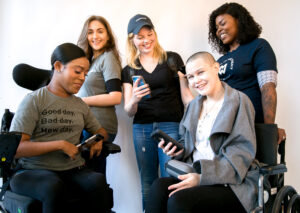
Disability and (In)Visibility: Not All Disabilities Are Visible
This week was the start of Disability Pride Month. We’ve loved seeing posts from our Friends in the Fight sharing their own stories of disability,

This week was the start of Disability Pride Month. We’ve loved seeing posts from our Friends in the Fight sharing their own stories of disability,

June is Myasthenia Gravis Awareness Month. If you have never heard of MG, you are not alone! We reached out to Friend in the Fight

Each year around June, I notice a smidge of angst rising in a small corner of my mind. The lingering chill of winter in New

Diversity inclusion in the workplace can have benefits for all involved. Not only does it make our society more equitable, but having diverse perspectives –

When I was 24, horribly ill and desperate for a diagnosis, I went to my doctor seeking answers. She was very kind and listened politely